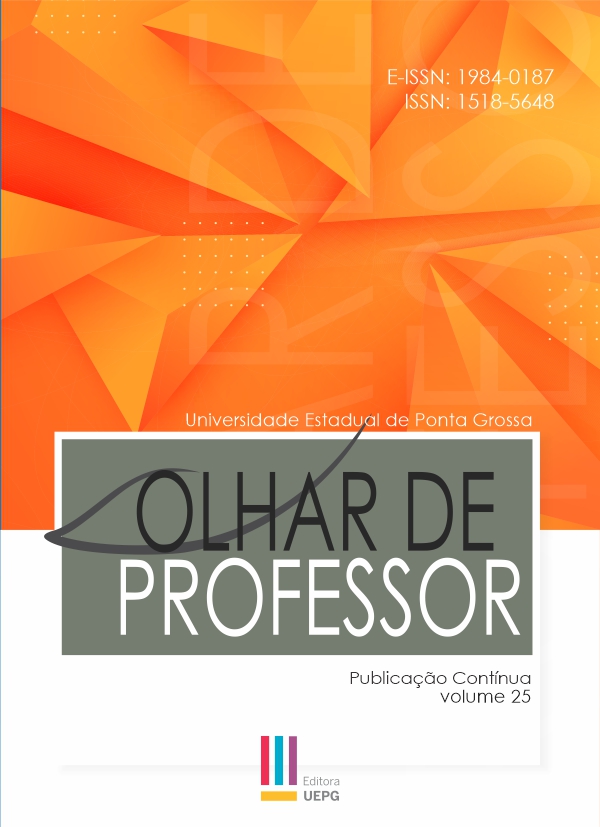A integração curricular para a concretização da educação na perspectiva da formação integral em uma escola de educação profissional no Ceará
Conteúdo do artigo principal
Resumo
O presente artigo visa refletir sobre a relevância da integração curricular na perspectiva da formação integral em uma escola de educação profissional no estado do Ceará. Para tanto, investiga como se dá essa integração entre as bases técnica e regular, e como tem se desenvolvido, considerando a integralidade da formação dos jovens atendidos por essa modalidade de ensino. Por se tratar de um estudo de caso com viés qualitativo, utiliza entrevistas estruturadas como instrumento de pesquisa, as quais foram realizadas com 5 professores, 7 alunos, 3 coordenadores e 1 diretor escolar. A partir dos resultados da pesquisa, fica evidente o distanciamento entre a educação básica geral e a educação profissional, permanecendo essa dualidade. Percebe-se uma dificuldade de implementação de uma Educação Profissional Integrada que seja efetiva no sentido dessa articulação, para que o sujeito seja formado na sua ampla capacidade física, intelectual e tecnológica. Esse distanciamento dificulta a integração curricular e o trabalho com esses jovens na perspectiva da formação integral. Surge a necessidade de se pensar estratégias e práticas que ampliem essa integração, primordialmente, por meio do estudo dos currículos dos cursos ofertados pela instituição e das reuniões pedagógicas de integração entre os eixos profissional e regular.
Downloads
Detalhes do artigo
Autores que publicam nesta revista concordam com os seguintes termos:
a) Os autores mantêm os direitos autorais e concedem à revista o direito de primeira publicação, com o trabalho simultaneamente licenciado sob a Creative Commons Attribution License Atribuição 4.0 Internacional (CC BY 4.0) que permite o compartilhamento do trabalho com reconhecimento da sua autoria e publicação inicial nesta revista.
b) Os autores são autorizados a assinarem contratos adicionais, separadamente, para distribuição não exclusiva da versão publicada nesta revista (por exemplo, em repositórios institucionais ou capítulos de livros), com reconhecimento da sua autoria e publicação inicial nesta revista).
c) Os autores são estimulados a publicar e distribuir a versão onlline do artigo (por exemplo, em repositórios institucionais ou em sua página pessoal), considerando que isso pode gerar alterações produtivas, bem como aumentar o impacto e as citações do artigo publicado.
d) Esta revista proporciona acesso público a todo o seu conteúdo, uma vez que isso permite uma maior visibilidade e alcance dos artigos e resenhas publicados. Para maiores informações sobre esta abordagem, visite Public Knowledge Project, projeto que desenvolveu este sistema para melhorar a qualidade acadêmica e pública da pesquisa, distribuindo o OJS assim como outros softwares de apoio ao sistema de publicação de acesso público a fontes acadêmicas.
e) Os nomes e endereços de e-mail neste site serão usados exclusivamente para os propósitos da revista, não estando disponíveis para outros fins.
______________

Este obra está licenciado com uma Licença Creative Commons Atribuição 4.0 Internacional.
Referências
CIAVATTA, M. O ensino integrado, a politécnica e a educação omnilateral. Por que lutamos? Trabalho & Educação, Belo Horizonte, MG, v. 23, n. 1, p. 187-205, abr. 2014. Disponível em: https://periodicos.ufmg.br/index.php/trabedu/article/view/9303/6679. Acesso em: 20 de janeiro de 2021.
DARCY, Ribeiro: a educação como legado. [S.l.]: Grupo Editorial Global, São Paulo, 2017. 1 vídeo (11min. e 49s). Disponível em: https://youtu.be/T1MemL_PmjI. Acesso em: 28 out. 2019.
DAYRELL, J. T. A escola “faz” as juventudes? Reflexões em torno da socialização juvenil. Educ. Soc., Campinas, SP, v. 28, n. 100, p. 1105-1128, out. 2007. Disponível em: https://doi: 10.1590 / S0101-73302007000300022. Acesso em: 2 mar. 2020. DOI: https://doi.org/10.1590/S0101-73302007000300022
DAYRELL, J. T. (org.). Por uma pedagogia das juventudes: experiências educativas do Observatório da Juventude da UFMG. Belo Horizonte: Mazza Edições, 2016.
DIAS, M. R. O solo educacional de um projeto e suas sementes. Escola do Herval: a teimosia da esperança. Juiz de Fora: CAEd: FADEPE, 2016. 73-85 p.
FREIRE, P. Educação como prática da liberdade. 31. ed. Rio de Janeiro: Paz e Terra, 2008. 158 p.
FREIRE, P. Pedagogia da autonomia: saberes necessários à prática educativa. 62. ed. São Paulo: Paz e Terra, 2019.
GADOTTI, M. Educação integral no Brasil: inovações em processo. São Paulo: Editora e Livraria Instituto Paulo Freire, 2009.
KRAWCZYK, N. Reflexão sobre alguns desafios do ensino médio no Brasil hoje. Cad. Pesquisa, [on-line], v. 41, n. 144, p. 752-769, 2011. Disponível em: https://doi.org/10.1590/S0100-15742011000300006. Acesso em: 20 dez. 2019. DOI: https://doi.org/10.1590/S0100-15742011000300006
KRAWCZYK, N. Ensino médio: empresários dão as cartas na escola pública. Educ. Soc., Campinas, SP, v. 35, n. 126, p. 21-41, 2014. Disponível em: https://doi.org/10.1590/S0101-73302014000100002. Acesso em: 20 dez. 2019. DOI: https://doi.org/10.1590/S0101-73302014000100002
MAINARDES, J.; CURY, C. R. J. Ética na pesquisa: princípios gerais. In: Associação Nacional de Pós-Graduação e Pesquisa em Educação. Ética e pesquisa em Educação: subsídios. Rio de Janeiro: ANPED, 2019. P. 24-29 Disponível em: https://anped.org.br/sites/default/files/images/etica_e_pesquisa_em_educacao_-_isbn_final.pdf. Acesso em: 20 jan. 2021.
RAMOS, M. N. Verbete Currículo Integrado. In: Fundação Oswaldo Cruz. Dicionário da Educação Profissional em Saúde. Rio de Janeiro: Escola Politécnica de Saúde Joaquim Venâncio, 2009. [n.p.]. Disponível em: http://www.sites.epsjv.fiocruz.br/dicionario/verbetes/curint.html. Acesso em 20 de janeiro de 2021.
RAMOS, M. N. Possibilidades e desafios na organização do currículo integrado. In: FRIGOTTO, G.; CIAVATTA, M.; RAMOS, M. (orgs.). Ensino Médio Integrado: concepções e contradições. 2. ed. São Paulo: Cortez, 2010. p. 106-127.
VERGARA, S. C. Métodos de coleta de dados no campo. São Paulo: Editora Atlas, 2009.





